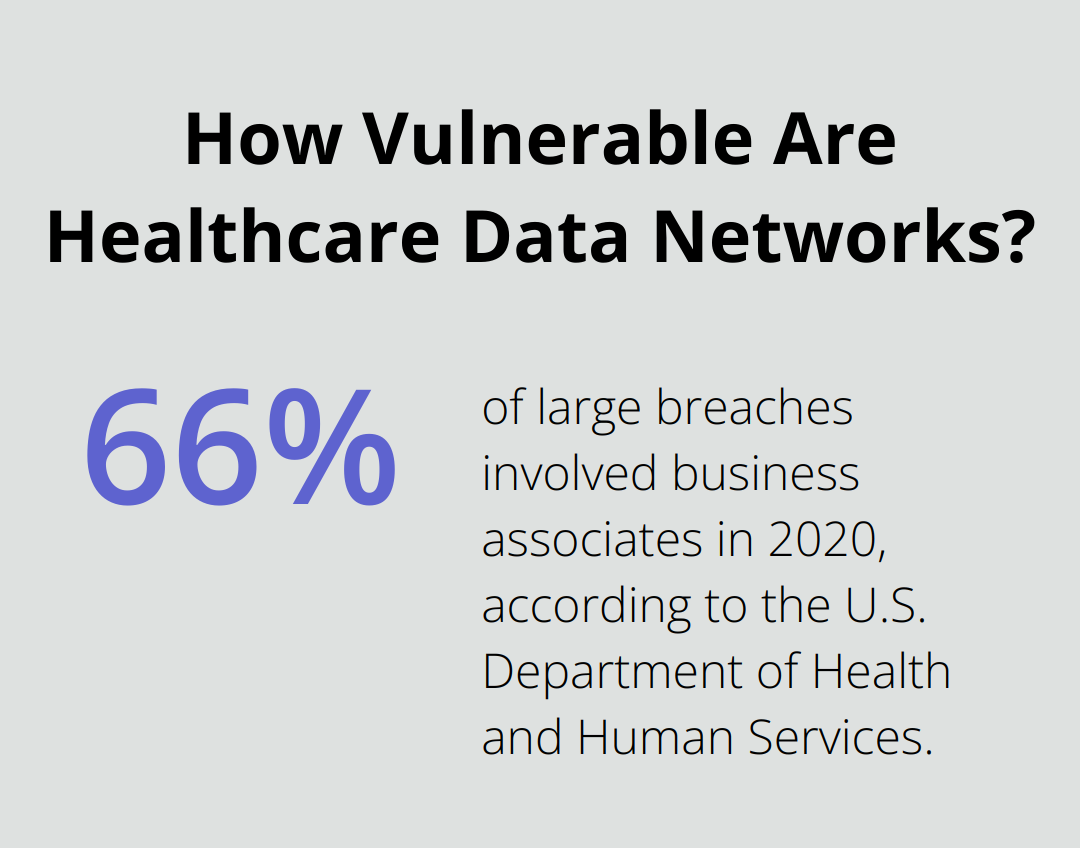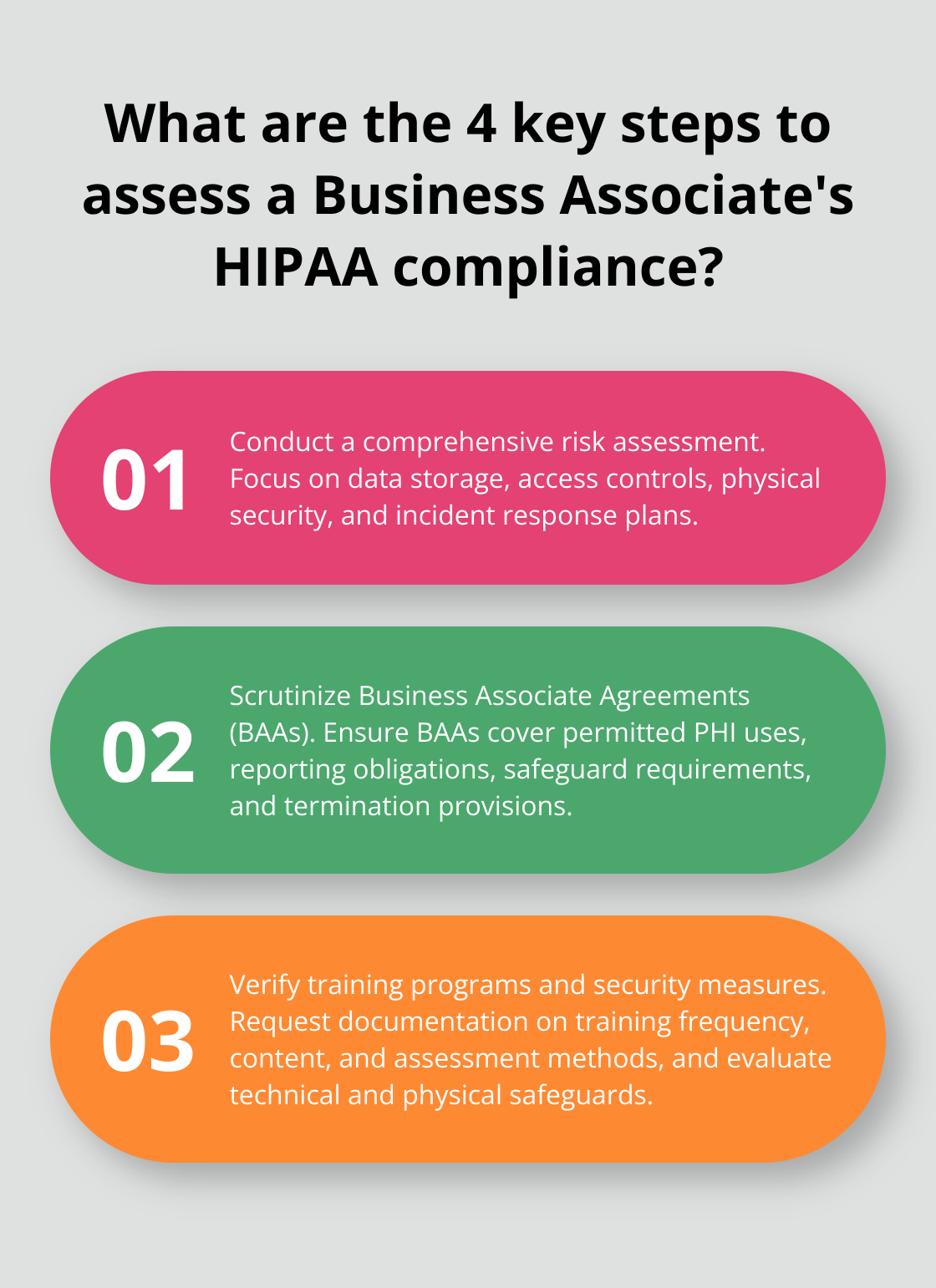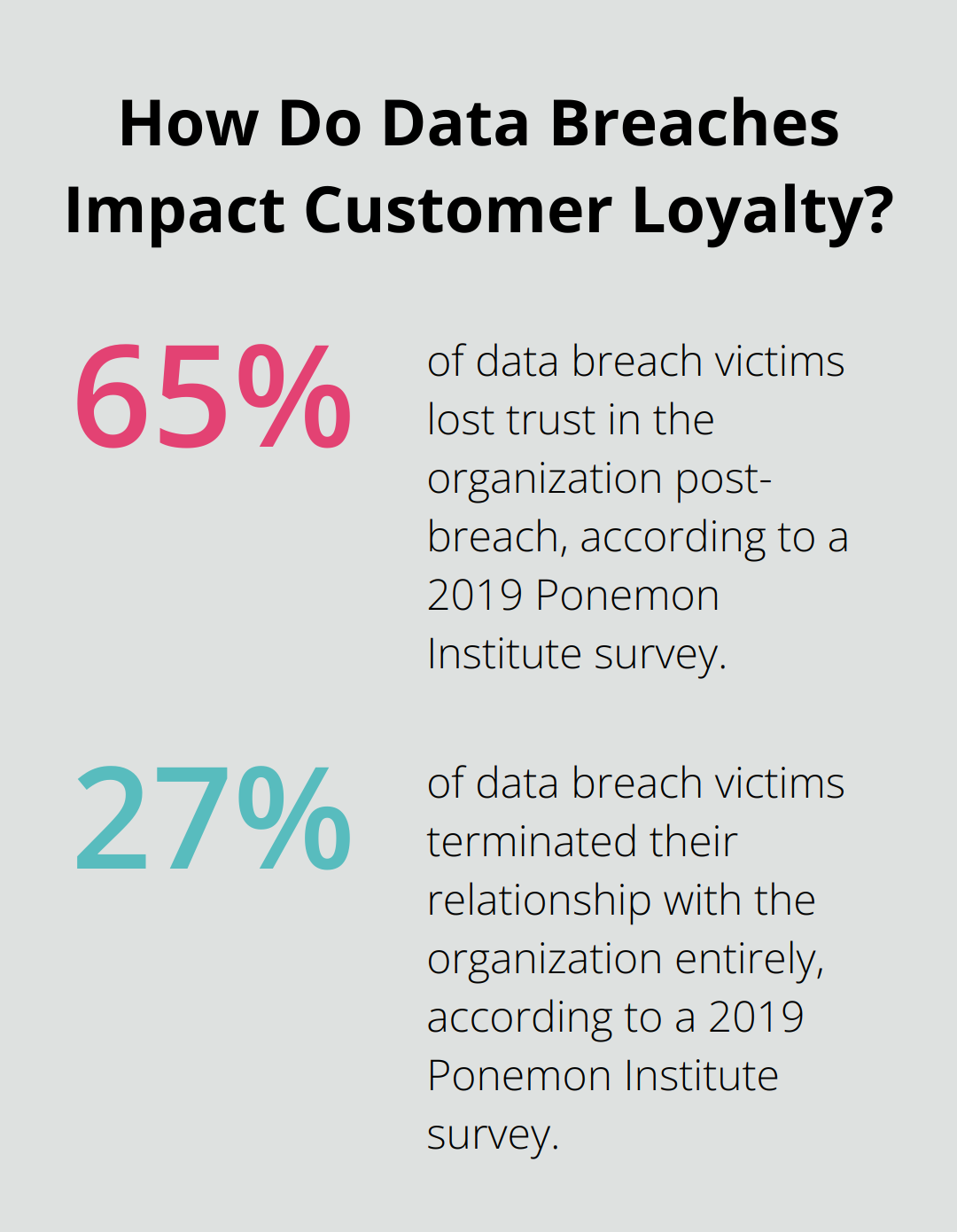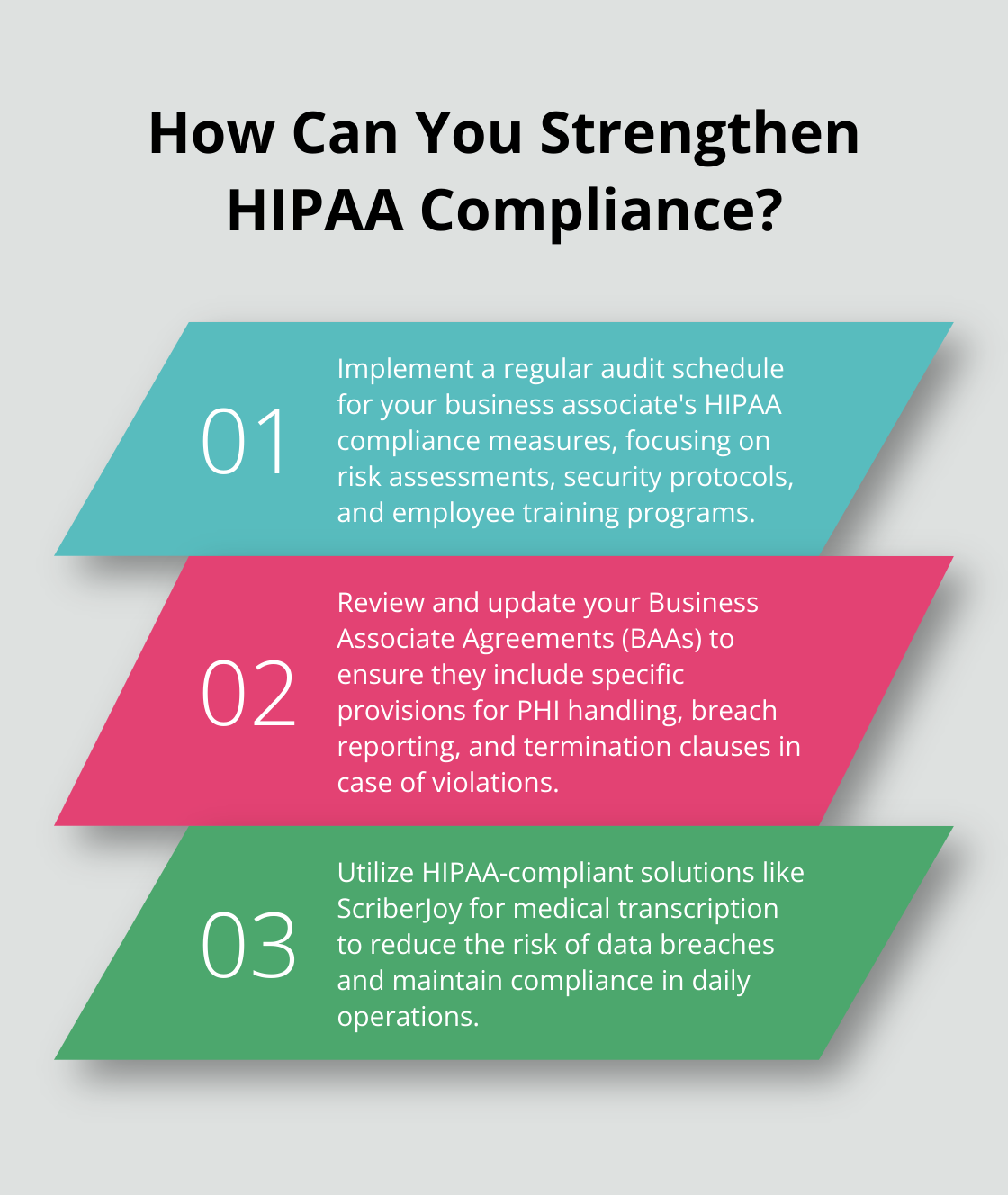HIPAA compliance for business associates is a critical aspect of healthcare data protection. At ScriberJoy, we understand the importance of safeguarding sensitive patient information throughout the entire healthcare ecosystem.
This blog post will guide you through the process of assessing your business associate’s HIPAA compliance, helping you mitigate risks and avoid costly penalties.
Who Are Business Associates and Why Does HIPAA Matter?
Defining Business Associates
Business associates play a vital role in the healthcare industry. They handle sensitive patient information on behalf of covered entities (healthcare providers, health plans, and healthcare clearinghouses). A business associate is any person or organization that performs certain functions or activities involving the use or disclosure of protected health information (PHI) for a covered entity.

Examples of business associates include:
- Medical billing companies
- Cloud storage providers
- Attorneys
- Accountants
- IT consultants with access to PHI
Even subcontractors of business associates who handle PHI fall under the business associate category according to HIPAA regulations.
The Importance of HIPAA Compliance
HIPAA compliance for business associates is not just a legal requirement; it forms the foundation of trust in the healthcare system. When business associates fail to protect PHI, the consequences can be severe. In 2018, a business associate breach at Accudoc Solutions affected 2.65 million patient records from Atrium Health, illustrating the massive scale of potential data exposure.
Key HIPAA Rules for Business Associates
Business associates must adhere to specific HIPAA rules to ensure the protection of PHI:
- The Privacy Rule: This rule establishes standards for the use and disclosure of PHI. Business associates must implement policies and procedures to limit PHI use to the minimum necessary for performing their duties.
- The Security Rule: This rule mandates the implementation of appropriate administrative, physical, and technical safeguards to protect electronic PHI. For instance, business associates must use encryption for data in transit and at rest.
- The Breach Notification Rule: In the event of a data breach, business associates must notify the covered entity within 60 days of discovery. The covered entity then has the responsibility to inform affected individuals and, in some cases, the media.
The U.S. Department of Health and Human Services reported that in 2020, 66% of large breaches involved business associates. This statistic underscores the importance of rigorous HIPAA compliance measures for all entities handling PHI.
The Impact of Non-Compliance
Non-compliance with HIPAA rules can lead to severe consequences for business associates (and the covered entities they serve). These consequences may include:
- Financial penalties: Fines can range from $100 to $50,000 per violation (with a maximum of $1.5 million per year for each violation).
- Reputational damage: Data breaches can erode trust and damage the reputation of both the business associate and the covered entity.
- Legal ramifications: Non-compliance can result in lawsuits from affected individuals or regulatory bodies.
The next chapter will explore how to assess your business associate’s HIPAA compliance, providing you with practical steps to ensure your organization remains protected in this complex regulatory landscape.
How to Assess Your Business Associate’s HIPAA Compliance
Conduct a Comprehensive Risk Assessment
A risk assessment forms the foundation of HIPAA compliance. Request your business associate to perform a thorough risk analysis of their systems and processes. This assessment should identify potential vulnerabilities in their handling of protected health information (PHI).

Key areas to focus on include:
- Data storage and transmission methods
- Access controls and authentication processes
- Physical security measures
- Incident response plans
Scrutinize Business Associate Agreements
Business Associate Agreements (BAAs) are legally binding contracts that outline the responsibilities of your business associate in protecting PHI. Review these agreements carefully to ensure they cover all necessary aspects of HIPAA compliance.
Essential elements of a robust BAA include:
- Specific permitted uses and disclosures of PHI
- Obligations to report security incidents or breaches
- Requirements for implementing appropriate safeguards
- Provisions for termination of the agreement in case of violation
Verify Training Programs and Security Measures
Your business associate’s employees serve as the first line of defense against HIPAA violations. Verify that they have implemented a robust training program to educate their staff on HIPAA regulations and best practices for handling PHI.
Request documentation of their training programs, including:
- Frequency of training sessions
- Content covered in the training
- Methods for assessing employee understanding
Additionally, evaluate their security measures. This includes both technical safeguards (like encryption and access controls) and physical safeguards (such as secure storage areas and visitor policies).
Implement Regular Audits and Assessments
HIPAA compliance is an ongoing process, not a one-time event. Establish a schedule for regular audits and assessments of your business associate’s compliance measures. These periodic checks help identify any new vulnerabilities or areas for improvement that may arise over time.
Consider using tools like ScriberJoy, which offers HIPAA-compliant medical transcription services, to streamline your documentation processes while maintaining compliance. Such solutions can significantly reduce the risk of data breaches and regulatory violations in your day-to-day operations.
The next chapter will explore the potential consequences of non-compliance, providing a clear picture of why maintaining HIPAA compliance is so critical for both covered entities and their business associates.
The High Cost of HIPAA Non-Compliance
Financial Penalties: A Hefty Price Tag
Non-compliance with HIPAA regulations carries severe financial consequences. The Office for Civil Rights (OCR) imposes fines ranging from $100 to $50,000 per violation, with a maximum annual penalty of $1.5 million for each violation category. In 2018, Anthem Inc. paid a record-breaking $16 million settlement for HIPAA violations affecting nearly 79 million individuals. This case highlights the astronomical costs associated with non-compliance.

Small businesses are not exempt from these substantial fines. A small dermatology practice in Massachusetts faced a $150,000 penalty in 2017 for failing to implement proper policies and procedures addressing HIPAA Rules’ breach notification requirements.
Reputational Damage: Eroding Trust and Relationships
HIPAA violations extend beyond monetary penalties, inflicting significant damage to an organization’s reputation. When an entity fails to protect sensitive health information, it shatters patient trust and tarnishes its standing in the healthcare community. A 2019 Ponemon Institute survey revealed that 65% of data breach victims lost trust in the organization post-breach, with 27% terminating their relationship entirely.
This erosion of trust leads to decreased patient retention and difficulty attracting new clients. For business associates, it may result in contract terminations with covered entities, effectively shutting them out of the healthcare market.
Legal Ramifications: A Web of Complications
HIPAA violations trigger a cascade of legal issues. Affected individuals may file lawsuits against both the covered entity and the responsible business associate. These legal battles drain resources and divert attention from core business operations.
In severe cases, the Department of Health and Human Services imposes corrective action plans, mandating extensive changes to an organization’s policies, procedures, and systems. These plans often involve ongoing audits and reporting requirements, placing a significant operational burden on the non-compliant entity.
State attorneys general also wield the authority to bring civil actions on behalf of state residents for HIPAA violations. In 2019, Medical Informatics Engineering paid $900,000 to settle a multi-state lawsuit brought by 16 state attorneys general for HIPAA violations affecting 3.9 million individuals.
Operational Disruptions: The Hidden Costs
Non-compliance often leads to operational disruptions that extend far beyond immediate financial penalties. Organizations may need to allocate substantial resources to address compliance issues, including:
- Staff retraining (which can be time-consuming and expensive)
- System upgrades or replacements
- Implementation of new security measures
- Ongoing compliance monitoring and reporting
These disruptions can significantly impact an organization’s ability to function efficiently and effectively, leading to decreased productivity and potential loss of business opportunities.
Final Thoughts
HIPAA compliance for business associates is a critical component of maintaining trust and integrity in the healthcare industry. The consequences of non-compliance affect business associates, covered entities, and patients whose sensitive information is at risk. Healthcare providers must conduct thorough risk assessments and regularly review Business Associate Agreements to ensure their partners’ HIPAA compliance.

Cooperation between covered entities and business associates creates a strong defense against data breaches and regulatory violations. We at ScriberJoy understand the importance of HIPAA compliance in medical documentation. Our HIPAA-compliant medical transcription software combines AI technology with human verification to ensure high accuracy while maintaining data security standards.
In today’s digital healthcare landscape, prioritizing HIPAA compliance for business associates protects patient trust, avoids costly penalties, and maintains the integrity of the healthcare system. Healthcare providers can focus on delivering quality patient care while having peace of mind about their documentation processes (when partnering with reliable, HIPAA-compliant services). Taking proactive steps to assess and ensure compliance will work towards a safer, more secure future for healthcare data management.

Leave a Reply
You must be logged in to post a comment.